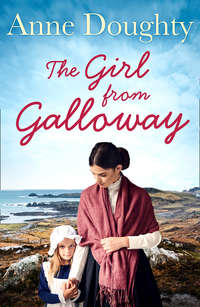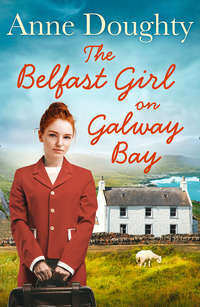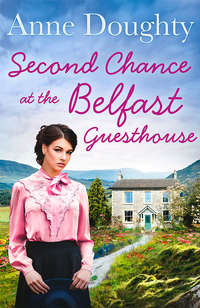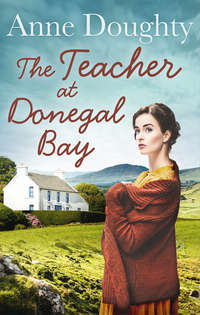
Полная версия
Last Summer in Ireland
Suddenly, a flash of light caught my eye. To my right, as far as the causeway reached before being enveloped in the woodland, a party of horsemen had just come into view and the sun glinted on their metal collars and the weapons they carried. They were moving fast. Moments later, over the thud of hooves, I heard the jingle of harness as they drew nearer.
Wanting to get a better look, I moved towards the rosemary hedge which bounded the vineyard. It was then I heard a rustle behind me. I turned and saw a young woman walking towards me, a wicker basket hung over one brown arm.
To be honest, I didn’t recognise her, but the moment she saw me, she held out her hands and smiled. With those grey eyes, it could be no one else. She seemed taller, less waif-like, more confident than I had remembered her. Pinned to the left shoulder of her pale olive green tunic was the brooch.
‘So you have come again as I prayed you would. You are so welcome. I hope the migraine troubles you no more.’
I was completely taken aback for the words she spoke were perfectly comprehensible.
‘Thank you, it went away when I slept. It hasn’t come back,’ I heard myself reply, to my amazement, as easily as she had spoken. And then I realised why: it was neither Italian, nor Greek, of which I have only a smattering – it was Latin. Not exactly the Latin of Tacitus or Pliny I know well, closer to the late Latin poetry I’d loved so much, and a form I could certainly follow. And it was clear from her cry of delight that she had understood what I had said.
‘But now you speak the tongue of Rome as I do. How is this? Come, let us sit in the shade. I have been waiting so long for you to come. But I had not thought we might speak words to each other that we might understand.’
She took my hand and led me to a stone bench below the colonnade. On either side of its fine-grained marble surface, two great wine amphora held single-petalled roses, one pink and one red. As I sat down I brushed against one of them and some petals fell, bright red splashes on the flagged terrace. I could see the veins in the rose, the grain in the quarried stone and feel the warmth of a brown hand holding mine.
Sitting there in the sunshine, her familiar-looking wicker basket at my feet, I felt both easy and excited. Easy, as with an old friend like Helen, whom I’ve known since our very first day at grammar school, and yet excited, like the first meetings with Matthew when it was so obvious to us both that all we wanted to do was be together.
There seemed so much we had to say to each other and yet a strange sense that we had shared so much already, as if we had been friends for a long time, but had been separated and now lived in different countries.
‘Please, how is it that you speak the Roman tongue?’
‘I learnt it at school in Ireland a long time ago.’
I thought my words sounded very stiff, rather like one of those guide books for eighteenth century travellers with phrases like: ‘My postilion has been struck by lightning.’ But if I was, it seemed not to bother her.
‘But we are in Ireland now, not far from the God’s well where I first met you. Do you not recognise this place? Over there to the west is Emain, and behind us is the town, Ard Macha, where the traders live. This is the villa of Alcelcius, my teacher.’
‘Is Alcelcius a Roman?’
I could not conceal my curiosity or my excitement. I so hoped she would say he was.
‘Yes, Alcelcius was a surgeon with the legions in Albi, but he came to Ireland disguised as an eye-doctor to spy for his general, who thought to conquer us. But Ireland conquered Alcelcius instead. He made his home here when he was discharged with honours.’
I laughed with delight. I knew it. I always knew it. I had been right after all. I was back at school, the soft voice of Miss Barbour in my ear. I had liked Miss Barbour very much, she was kind, hard-working and very fair. Without her, I would probably never have won my scholarship to university. But she would never accept a statement unless I could produce concrete evidence. I could still hear her steady, unperturbable tone.
‘Well, yes, Deirdre, I can see the reasoning behind your suggestion. The Romans were indeed adventurous, they do show a decided tendency to explore and document, but we have no evidence at all that they came to Ireland. It is true, Agricola did calculate that he could subdue the country with two legions, but the attempt was never made. As we all know, he shortly had to give his mind to more pressing problems.’
And with those quiet, bleak phrases, quite unknowingly she had snuffed out some possibility that was beginning to grow in my mind. I had felt such loss, such disappointment, and now suddenly that old hope returned.
‘And are you also Roman?’ I asked quickly, the words coming to me more easily now, in spite of my haste.
Her face, so full of pleasure and enthusiasm, changed instantly and I glimpsed a different Deara, vulnerable and ill at ease.
‘I know nothing of my family,’ she said uneasily. ‘I was brought up by the Lady Merdaine of Emain, but she died some four years ago, a few days before you first came to me. After her death I came to study with Alcelcius. He is such a good, kind man. He has taught me Latin and Greek, as well as medicine and the ways and customs of the Romans. Have you come from Rome?’
I shook my head and smiled.
‘No, I’m not a Roman. I’ve been to Rome once, many years ago, but there haven’t been Romans in Britain for a very long time. I think you and I live in different ages rather than in different places. Can you tell me what year it is, here, at this moment?’
The grey eyes widened and she nodded slowly.
‘This is the fourteenth year of the reign of Niall, son of Laoghaire, King of Tara and the tenth year of the reign of Morrough, son of Ferdagh, King of Emain.’
I shook my head and laughed, none the wiser.
‘That sounds like a long time ago. Presumably the Romans are still in Britain?’
‘Britain? Where is that, please?’
I tried to think what Britain was called in Roman times, but I just couldn’t remember.
‘Where Londinium is,’ I offered helpfully.
‘Ah yes, Londinium. Alcelcius served there before he went north to Eboracum. You know Londinium?’
‘Yes, I live and work there, but it’s rather larger now than it was in Alcelcius’s day . . . or rather, I mean . . .’
‘You mean that you have come from the future?’
‘It looks like it. I know quite a lot about the Roman Empire and I’ve read Agricola, but his world was about nineteen centuries before the time in which I live.’
‘So, how have you come? Why have you come?’ she asked earnestly, pressing my hand, as if my answer was of the greatest importance to her.
‘I don’t know. Why did you come to me six days ago when I was sitting crying with my migraine?’
She shook her head gently and smiled, that lovely warm smile which banished all anxiety.
‘My friend, for you the time was but six days, for me, four years and four months. It seems there is much we do not know. But some things are clear to us.’
‘Such as?’
‘Who we are. That we are friends.’
She leaned forward and kissed my cheek. I was terribly taken aback. Until I met my sister-in-law, Diana, I’d never been kissed by a woman. She’s one of those Anglican clergy wives who kisses everyone, so it shouldn’t have been a problem, particularly as I happen to like her. But it was. Every time Matthew and I went to visit I d get worried I might react in spite of myself. Eventually we managed to work out what lay behind it. Mother, of course. As if we couldn’t have guessed. She’d never held or kissed either Sandy or me, even when we were very little, and her comments were always quite vicious if she ever saw two women kiss each other.
‘Please, tell me your name,’ she said earnestly.
‘Deirdre.’
‘Oh . . . so . . .’
Her eyes grew round with amazement.
‘What’s so strange about that?’ I asked, as I saw her begin to smile.
‘I too am Deirdre, but only a few people know that, a Druid who bears me ill will and my foster-mother, who gave me the name Deara.’
‘But why did she do that?’
‘Because Deirdre was a name too hard to bear.’
She said it so softly that I wasn’t sure I had heard her properly, and yet I felt it was the most important thing she could have said. Yes, it was too hard to bear, being Deirdre. Often enough, just existing could be too hard to bear.
I thought of the strange scenes and images I’d experienced when Deara had laid her hands upon me and all that had come to me in the days that had followed. Her life had been as full of anxious thoughts as mine seemed to be. I wanted to understand how and why this had happened to her. I asked her about the woman who had died by the God’s well, about the Druid who had tried to have her executed. And she answered all my questions, quite easily and steadily, explaining both what had happened on the night of her birth and how Conor had behaved towards her as she was growing up.
‘But, Deirdre, how is it you know these things about my life when we have not spoken of them until now?’
I was about to explain, when suddenly the warm stillness of the afternoon was broken by the most appalling noise, a kind of high-pitched scream, followed by shouts and a fierce metallic banging like the dustbin lid protests up the Falls Road in the early days of The Troubles.
I jumped and went rigid. Her hand tightened around mine and she said softly: ‘It’s all right, Deirdre. The King has arrived back at Emain with the ambassadors from Tara. That was the guard shout and the warrior greeting. I hate it too. When I’m up there and it happens, I hide in my workplace till the speeches begin. They go on a long time, but they’re quiet. Did you see the King’s party pass by?’
I nodded, not yet trusting my voice, for my heart had leapt into my mouth at the sudden jarring noise.
‘Just a glimpse, before I saw you,’ I managed to reply, my mouth suddenly dry. ‘Was that the King at the front?’
‘Yes, it would have been. He is always so happy to ride home. He’s not overfond of Tara and he hates negotiations, but that is the only way to keep the peace. Without going to Tara, it would be easy for enemies to make trouble between Emain and Tara. Then many suffer, not just warriors. Do you live in a time of peace, Deirdre?’
I shook my head wearily. I could not bear to tell her of the killings, the car bombs, the ambushes and the thousands of innocent people the last years of bitterness and hatred had claimed.
Again, a violent clamour erupted from the west. I felt it like a physical blow, but before I could react she took my other hand. I saw the look of concern on her face as she explained gently and patiently, as one does to a frightened child, that the guest cup is offered to the ambassadors, and it is the children who make the noise with blunt swords and broken shields, a tradition which would not go on for more than a few minutes.
I seem always to have hated loud noises. Long before The Troubles began, with their real threat from bombs and bullets, I had jumped out of my skin at fireworks, or cars backfiring, or even some child bursting its paper bag at lunchtime. The racket had now died away. I took a deep breath and tried to forget it.
‘Is it impolite if I ask what age you are, Deara?’ I asked, knowing that I sounded formal again because I couldn’t find a word for ‘rude’, only one for ‘vulgar’ and another for ‘obscene’.
‘Surely not. I was twenty-one in the fifth month of this year. And you, my friend?’
‘I shall be thirty-five in a few months’ time.’
‘By then we shall have known each other a long time.’
‘What do you mean?’
‘I don’t exactly know what I mean, but that is how it seems to me. We shall be good friends, shall we not?’
She looked at me with the warm smile which I found so utterly appealing. I was about to speak of the hope that was beginning to grow in me, born out of the strange situation in which we found ourselves. But I didn’t manage it. Without any warning, a huge noise away to my right broke in on me, a noise that filled up all the space inside my head.
‘That noise, Deara, that awful noise. Whatever is it? Make it stop. Oh, please make it stop. I can’t bear it. It feels as if it will make my head burst.’
I covered my ears with my hands and felt tears spring to my eyes. She couldn’t hear it. I knew she couldn’t hear it. And she wouldn’t believe me if she couldn’t hear it. Nothing I could say would make her believe me. I wanted to scream and scream, but no sound would come. Everything was blotted out by pulsing waves of pressure. I couldn’t even see her any more. Then I felt her hands on my wrists.
‘Deirdre, my dear friend, I am here. Give me your hands. Do not shut out the noise. Listen to it. Let it speak to you. I will not let it harm you.’
There was a strength in her voice I had not heard before. It was firmer than reassurance, much firmer, it was the strength of one who speaks to command. She drew my hands away from my ears and held them firmly in her own.
‘Listen, listen to it,’ she insisted quietly. ‘It cannot harm you now.’
As suddenly as it had begun, it stopped. I could see her face again. She was watching me with enormous concentration. She released my hand as I moved to get my hanky out of my pocket. I blew my nose and mopped up my tears.
‘Are you all right now? Has the noise gone?’
‘Yes, it’s gone. I’m so sorry, I can’t think what happened to me. It’s so silly. Please forgive me.’
‘Forgive you? What is there to forgive between us? It is you who must forgive the woman who harmed you in this way.’
‘Woman? What woman?’
‘A woman with glass in front of her eyes who crept up behind you when you were sitting on the stones by the God’s well and talking to yourself. The same woman in a long bedgown who found you walking in your sleep and scolded you, and when you spoke of hearing a noise she said you were telling lies. A woman who did not comfort you when you wept.’
‘That’s my mother. She died the week before last.’
‘Such women leave great burdens on the spirit. You must rest and pray to your God.’
‘I have no God.’
‘Then I shall pray to mine. It makes no difference,’ she said, as she touched my cheek with her hand. ‘You are very pale. Will you drink a cup of wine? It would help you.’
Suddenly I became so aware of the blue threads in my jeans, the fallen petals of the rose and the soft, brown hand still holding mine.
‘Thank you,’ I said, nodding and looking up at her.
But she was gone. I was sitting on my stone under the hawthorns. Indoors, the phone was ringing. I didn’t move. I let it ring until it stopped.
I sat on for quite a while, letting myself absorb what had happened. Then I realised how thirsty I was. I got up and walked across the garden to the path along the bottom edge of the rockery. There was the circle I had begun and not completed. I bent down and drew my finger through the soil to close it.
The phone rang again, that fierce, strident ring I could identify as the Anacarrig phone from wherever in the world I might hear it. I went in and picked it up.
‘Deirdre Weston speaking.’
I heard my name as if it were the first time I’d ever used it. It was the estate agent with a query about the rateable value. I told him what he wanted to know and wished all queries could be dealt with so easily. And yet, as I filled the kettle, I felt sure that finding answers to the questions that were really important to me was going to be a whole lot easier. If there was something I had to do while I was here, then I was being helped to do it. There was no point asking for it all to be clear to me now: I just had to get on and do the best I could.
9
Despite the optimism of the estate agent, no prospective purchasers arrived to view Anacarrig the weekend after my meeting with Deara in Alcelcius’s vineyard. I had a blissful two days. It was warm and sunny and working in the garden was a delight. I read a lot, wrote a massive letter to Matthew and short notes to some of my local friends suggesting that we meet.
More than once, I caught myself just sitting, lost in my own thoughts, beside a flowerbed I had set out to weed or a bookcase I had decided to sort and pack. Once, I even found myself sitting on the low wall near the back door unable to remember what I was supposed to be doing there until I saw the neatly tied bag of rubbish at my feet.
To my amazement, the peaceful quality of the weekend persisted into the following week. We all have good hours and good days, times when things go right beyond all reasonable expectation, but that whole week it appeared I could do no wrong. Whatever I put my hand to, some tedious job in the house or some piece of executor business, the problems just melted. Like the child who had once walked round the garden with a magic ring, making things happen, I appeared to be mistress of all I surveyed.
Entirely new to me was the sense of steadiness and purpose I felt. Sometimes I just marvelled at my good fortune; at other times, I found I was looking around for new worlds to conquer and had to laugh at myself.
I was able to finish a routine piece of work for Robert Fairclough in record time and I had lively phone calls from the friends to whom I’d written. I wrote page after page in my blue notebooks, sketched out thoughts for short stories, and developed an idea for a longer work. As if this were not joy enough, early one morning I even had a call from Matthew in Maharajpur.
We tripped over each other and said the most banal things in the few minutes that could be spared on the up-country hospital’s one and only phone. There would be another opportunity for us to go to India together and work on the project we’d had to set aside this summer, he said. He sounded so excited at the prospect and both pleased and relieved that I was in such good spirits with things going so well at Anacarrig.
But beyond and behind all the objective things that had lifted my spirits, there was Deara. Unlike any friend I had ever had, however dear, her presence seemed to reassure me in a way I could not put words to as yet.
When I tried to puzzle it out, I told myself it was because she had survived a situation far, far more dangerous than anything I had ever experienced. With no one to care what happened to her, she had been totally vulnerable after Merdaine died. The actual threat from the Druid I would have found terrifying. And yet, despite everything being against her, she had won through, she had kept her nerve and ended up with Alcelcius, a man who was not only kind but one she could be sure would never let her down.
Day after day as I went on with the work in the garden, I thought about her, going over in my mind all I knew of her, putting together everything that first meeting had offered with what she herself had told me when we discovered we could talk to each other. I longed to see her again, and yet, as I moved through those memorable days, I felt she was with me, an active presence in my life, steadying me, showing me ways of being that were new to me, bringing me hope and confidence.
Whether it was thinking of Deara or the happy chance of Mother’s car having arrived back from the garage, I really don’t know, but on the Friday afternoon, I suddenly put down my trowel, abandoned my bucket of weeds, scrubbed my fingernails at the kitchen sink and set off for the library in Armagh.
The magic of the week was still at work when I got there. I almost burst out laughing when the librarian looked up from her filing in the empty reading room. It was Maureen Purdy. Years ago, at primary school, when we came top of the class in reading, Maureen and I had had the job of going to the library and choosing the weekly box of books for our class.
‘Deirdre Henderson, how are you? When did I last see you?’
The reading room was unusually quiet that afternoon, so Maureen was free to talk to me. We spoke about our schooldays and she filled me in on the lives of school friends I hadn’t heard of for years. Then I told her I’d got interested in the fifth century. By the time I left, she’d made me a list of titles for the early Christian era and suggested I go round and meet the curator of the museum who had made a special study of that period.
When I did track him down in his minute, congested office, I discovered his wife had been at Queen’s with Sandy. I’d been working in London so long I’d almost forgotten what a close and intimate community I’d once been part of. As I watched him raiding his shelves and extracting material from his own files to photocopy for me, I felt quite overwhelmed by his generosity and his willingness to help. This responsiveness, this kindness, was once a familiar part of my experience. It was a part with which I had completely lost touch.
Back at Anacarrig I staggered into the house with my arms full and caught sight of myself in the hall mirror. I was wearing such a broad grin I reckoned I must look like the lucky winner of one of the ‘Biggest Ever Prize Draws’ that kept dropping through Mother’s letterbox despite all my efforts to turn them off.
I laid out all my stuff in the sitting room, books and photocopies and lists of forthcoming publications. I was tempted to sit down and begin reading there and then, but I remembered I’d just dropped my tools and gone off into town, so I went back out into the garden.
The mixed perfumes of the newly opened perennials and the very first rosebuds lay on the warm air. All was quiet. I went on where I’d left off and when I tired I fetched some of my new books and sat under the hawthorns in the last of the sunshine. Soon I was so absorbed, had the phone not rung I’d probably have been there till it was too dark to see the print.
It was Helen, safely back from Oxford and looking forward to our meeting the next evening. As I put the phone down I thought of the calls I’d been putting off. I’m happy enough to talk on the phone once I get started, but I’m often reluctant about actually making them. I brought a chair into the hall and settled down to make up for my delays.
I rang the rectory in Norfolk, spoke to John and passed on Matthew’s news from Maharajpur. Then a marvellous talk with my sister-in-law, Diana, which included her account of the latest episode in the long-running row among the flower ladies over the colour scheme for the patronal festival.
Still smiling, I rang Tanza Road and heard Joan’s familiar voice. She had some really exciting news. Her great-niece Sarah had just been accepted for the Purcell School; the scholarship would give her the best possible opportunity to become the clarinet player she wanted to be. Joan questioned me most carefully and sympathetically about the trials of clearing the house. I felt so grateful I had a friend of her wisdom and experience, one who would actually speak about mortality and its effects upon you instead of merely uttering the conventional platitudes and cliches which made her feel comfortable.
Конец ознакомительного фрагмента.
Текст предоставлен ООО «ЛитРес».
Прочитайте эту книгу целиком, купив полную легальную версию на ЛитРес.
Безопасно оплатить книгу можно банковской картой Visa, MasterCard, Maestro, со счета мобильного телефона, с платежного терминала, в салоне МТС или Связной, через PayPal, WebMoney, Яндекс.Деньги, QIWI Кошелек, бонусными картами или другим удобным Вам способом.






